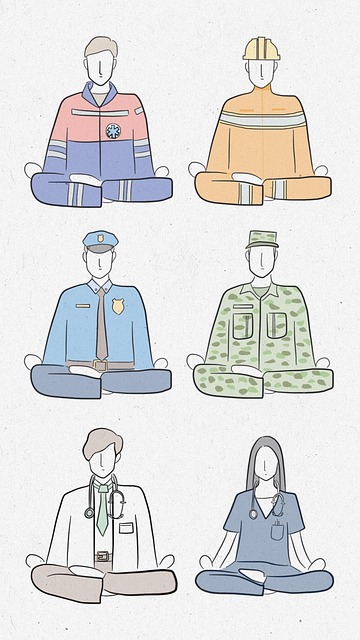Northglenn Dialectical Behavioral Therapy (DBT) is an effective, evidence-based approach to managing chronic stress and improving mental health. By combining cognitive techniques, mindfulness practices, and lifestyle modifications, DBT empowers individuals to identify triggers, develop coping strategies, and enhance emotional resilience. This holistic therapy reduces anxiety, depression, and physical health risks associated with prolonged stress, fostering overall well-being through tailored support and accessible resources.
Stress reduction is essential for maintaining optimal mental health and overall well-being. This comprehensive guide explores effective methods to combat stress, offering insights into various strategies that can profoundly impact your life. From understanding the profound effects of stress to discovering powerful tools like Northglenn Dialectical Behavioral Therapy (DBT), cognitive techniques, mindfulness practices, and lifestyle changes, this article equips you with the knowledge to embrace a calmer, more resilient existence.
- Understanding Stress and Its Impact
- The Role of Northglenn Dialectical Behavioral Therapy (DBT) in Stress Reduction
- Cognitive Techniques for Managing Stress
- Mindfulness Practices for a Calmer Mind
- Lifestyle Changes to Boost Resilience and Well-being
Understanding Stress and Its Impact

Stress is a natural response to demanding or threatening situations, but when it becomes chronic, it can significantly impact our physical and mental health. Understanding stress involves recognizing its triggers and the various ways it manifests in our lives. In Northglenn, Dialectical Behavioral Therapy (DBT) offers a comprehensive approach to managing stress by teaching individuals effective coping mechanisms. This therapy is particularly beneficial for those struggling with emotional regulation and distress tolerance.
The impact of prolonged stress can be far-reaching. It may lead to increased anxiety, depression, and even physical ailments such as high blood pressure and weakened immune systems. However, incorporating practices like mental wellness journaling, exercise guidance, and social skills training into daily routines can help mitigate these effects. By fostering better mental wellness, these strategies empower individuals to navigate stressful situations with resilience, promoting overall well-being.
The Role of Northglenn Dialectical Behavioral Therapy (DBT) in Stress Reduction

Northglenn Dialectical Behavioral Therapy (DBT) has emerged as a powerful tool in the arsenal of stress reduction techniques. This therapeutic approach is specifically designed to help individuals manage intense emotions, develop effective coping skills, and improve their overall quality of life. DBT combines cognitive-behavioral techniques with mindfulness practices, offering a comprehensive framework for emotional healing processes.
By focusing on both individual and interpersonal aspects of mental health, Northglenn DBT provides trauma support services that cater to diverse needs. It teaches clients valuable coping skills development strategies to navigate challenging situations, fostering resilience and emotional balance. This tailored approach has proven effective in reducing stress, anxiety, and depression, ultimately enabling individuals to lead more fulfilling lives.
Cognitive Techniques for Managing Stress

Cognitive Techniques for Managing Stress offer a powerful toolkit for individuals seeking to navigate life’s challenges with resilience and equanimity. This method, often a cornerstone in therapies like Northglenn Dialectical Behavioral Therapy (DBT), focuses on identifying and challenging negative thought patterns that contribute to stress. By cultivating awareness of one’s thoughts and emotions, individuals can learn to detach from distressing feelings and adopt healthier perspectives.
Through consistent practice, these cognitive techniques foster emotional healing processes, enabling folks to better manage their reactions to stressful situations. The Northglenn DBT approach encourages individuals to explore the intricate web of their thoughts, beliefs, and behaviors, ultimately aiming for a more balanced and resilient mindset. This process is further enhanced by resources like the Mental Wellness Podcast Series Production, which provides accessible platforms for learning and Trauma Support Services tailored to address deep-seated emotional challenges.
Mindfulness Practices for a Calmer Mind

Mindfulness practices have emerged as a powerful tool for calming the mind and reducing stress, making them an integral part of Northglenn Dialectical Behavioral Therapy (DBT) programs. These techniques encourage individuals to focus on the present moment, observing their thoughts and emotions without judgment. Through mindfulness meditation, deep breathing exercises, and mindful movement, people can cultivate a greater sense of self-awareness and emotional regulation. This, in turn, helps to manage stress responses and reduce the impact of triggers that can lead to intense emotions.
Incorporating mindfulness into daily routines can significantly enhance one’s ability to navigate life’s challenges. By prioritizing Self-Care Practices and Emotional Well-being Promotion Techniques, individuals equipped with DBT skills become better prepared to handle stressors. The benefits extend beyond therapy sessions, as these practices foster resilience and a deeper understanding of one’s emotional landscape. Cultural Competency Training also plays a role in ensuring that mindfulness techniques are accessible and beneficial for all, regardless of background or experience.
Lifestyle Changes to Boost Resilience and Well-being

In the pursuit of stress reduction, Northglenn Dialectical Behavioral Therapy (DBT) offers a transformative approach to cultivating resilience and enhancing overall well-being. This evidence-based therapy is particularly beneficial for individuals navigating mental health challenges, focusing on both emotional regulation and distress tolerance skills. By integrating DBT into daily routines, one can effectively manage stress and improve their ability to cope with life’s demands.
Lifestyle modifications play a pivotal role in this process. Engaging in regular physical activity, practicing mindfulness techniques, and adopting healthy sleep habits are cornerstones of this strategy. These simple yet powerful tools help regulate mood, boost emotional well-being, and foster a sense of balance. Additionally, Mental Health Policy Analysis and Advocacy can empower individuals to navigate systems and access resources that support their journey towards stress reduction and emotional growth, complementing the techniques learned through DBT and Emotional Well-being Promotion Techniques.
In conclusion, managing stress effectively is key to enhancing our overall well-being. By understanding its impact and employing various reduction methods, we can lead more balanced lives. The article has explored powerful tools such as Northglenn Dialectical Behavioral Therapy (DBT), cognitive techniques, mindfulness practices, and lifestyle changes, all of which play crucial roles in navigating stress. Integrating these strategies into daily routines can foster resilience, promote a calmer mind, and ultimately improve our quality of life.












